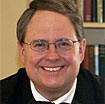Commentary on Mark 9:2-9
Most congregations would drown in this text’s cascade of details. “Six days later.” “A high mountain apart.” “Elijah with Moses.” “Let’s make three dwellings.” “A cloud overshadowed them.”
Each of these items chimes with the Old Testament. In earlier eras preachers were expected to explain everything. We are not Aquinas or Luther or Wesley; our audiences do not live in the thirteenth, sixteenth, or eighteenth centuries. My advice is to bracket out, at most brush over, most of these allusions. Save them for an hour of solid Christian education. This Sunday find your focus and hold it tight. Mark’s climax, I believe, lies in 9:7: “This is my Son, the Beloved; listen to him!”
“This is my Son”: the second of three decisive acclamations of Jesus’ unique identity in Mark. The first is at his baptism (1:11); the last, at his death (15:39). In all three episodes the atmosphere is apocalyptic in the strict sense: revelatory. The curtain is drawn away from normal appearances, allowing us a glimpse of God behind them. Of these epiphanies Mark 9:2-8 may be the weirdest. It is the least public, farthest removed from the commonplace (9:2). Events are literally beclouded (9:7). Jesus — he alone (contrast Luke 9:30-31) — is “transfigured”: metamorphosed in raiment that is “dazzling white” (Mark 9:3). No one on earth looks like this: such radiance, kabod, is God’s very essence (Exodus 16:10; Numbers 14:10b; Psalm 63:2). Only those judged righteous “will shine like the sun in the kingdom of their Father” (Matthew 13:43; see also Daniel 12:3; Philippians 3:21). Here Mark is dramatizing what the Fourth Gospel claims of Jesus: “The light shines in the darkness, and the darkness did not overcome it” (John 1:5; also 8:12; 9:5; 12:46).
“This is my Son, the Beloved” (Mark 9:7). The speaker is God (1:11; see also Deuteronomy 4:36; 2 Samuel 22:14; John 12:28; Acts 11:9). In Mark no one else is designated “God’s Son.” Not Moses. Not Elijah. Not John the baptizer. None of Galilee’s other itinerant preachers or exorcists (Mark 6:7, 12-13; 9:38). Only Jesus is the beloved (agapetos) Son, as Isaac was to Abraham (Genesis 22:2, 12, 16): “unique,” “one-of-a-kind.” A father’s love for such a son is fathomless, precisely because there is no other.
“Listen to him!” (Mark 9:7). For the first and only time in Mark, the voice from heaven orders Jesus’ disciples. This command recollects Moses’ directive: Israel should heed a prophet whom the LORD God would raise up (Deuteronomy 18:15). In Jesus, God has done this; Israel’s successors should respond appropriately. To what should Jesus’ disciples pay attention? Presumably, everything in Mark that Jesus says and does. Immediately it refers to God’s design for the Son of Man’s suffering and vindication (Mark 8:31), the adoption of cross-bearing discipleship (8:34-35), keeping mum about what has been seen until after the resurrection (9:9), and assurance that all proceeds according to the divine plan (9:11-13). These are the very things that his disciples find so hard to understand, to accept, and to obey (9:31-34; 10:32-37; 14:26-31, 50, 66-72; 16:1-8). As suddenly as it struck, the mountaintop vision fades: a handful of disciples are alone with Jesus (9:8).
From this point the preacher must decide what theological issue most needs development this Sunday for this congregation. Here are only three from among many possibilities.
- Who is Jesus, for us and for the world? Many Protestants are virtual Ebionites: they have lost any appreciation of Jesus’ divinity by the canons of orthodox Christianity. It’s easy to regard Jesus as a sage, hero, scamp, or fool. Some among our congregants hide out with The History Channel’s Jesus and never come out. Mark 9:2-9 uncages a Jesus so tamed. A sermon along this line is unlikely to change fixed minds. It may begin to unsettle them, or at least to set them wondering. If Jesus is nothing more than an oddball Jew from antiquity, to whom does the church bear witness? If the church has so little to confess, why on earth are we here?
- Who, in fact, is the Son of God? The nation Israel was sometimes characterized as God’s sons (Exodus 4:22-23; Jeremiah 31:9; 20; Hosea 1:10). Israel’s king was ceremonially regarded as “Son of God” (2 Samuel 7:13-14; Psalm 2:7). Caesar Augustus was acclaimed divi filius, “deified son” (Suetonius, The Divine Augustus). If Mark’s witness is credible, if God reckons Jesus alone as “the beloved Son,” then no one else qualifies. Needful to say, equally disqualified are today’s church and presidents and potentates who yearn for such adoration and power. The devil tempted Jesus to self-reliance, political dominion, and civil religion (Matthew 4:1-11 = Luke 4:1-13). When last I noticed, Satan hasn’t quit trying to seduce us.
- Are we listening? Igor Stravinsky said, “To listen is an effort, and just to hear is no merit. A duck hears also.” If this is true of music, how much more does it bear on Jesus’ commands? It is one thing to admire the Messiah; to obey him is something else. “Follow me” (Mark 1:17; 2:14). “Pay attention to what you hear” (4:24). “Do not be afraid, only believe” (5:36; 6:50). “You give them something to eat” (6:37). “It is what comes out of a person that defiles” (7:20). “Deny [yourself] and take up [your cross] and follow me” (8:34). “But many who are first will be last, and the last will be first” (10:31). “Whoever wishes to be first among you must be slave of all” (10:44). “Whenever you stand praying, forgive, if you have anything against anyone” (11:25). That’s only from Mark; Matthew, Luke, and John offer more. Anyone who thinks Christian faith is a retreat from reality is clueless.
Whatever direction your sermon takes, invite your listeners into its mystery. Like Christmas and Easter, Jesus’ transfiguration is uncanny. Well-placed wonder is in short supply. Peter and his confrères were terrified and tongue-tied (Mark 9:6). When we stand before God, that’s a proper response.


February 11, 2018